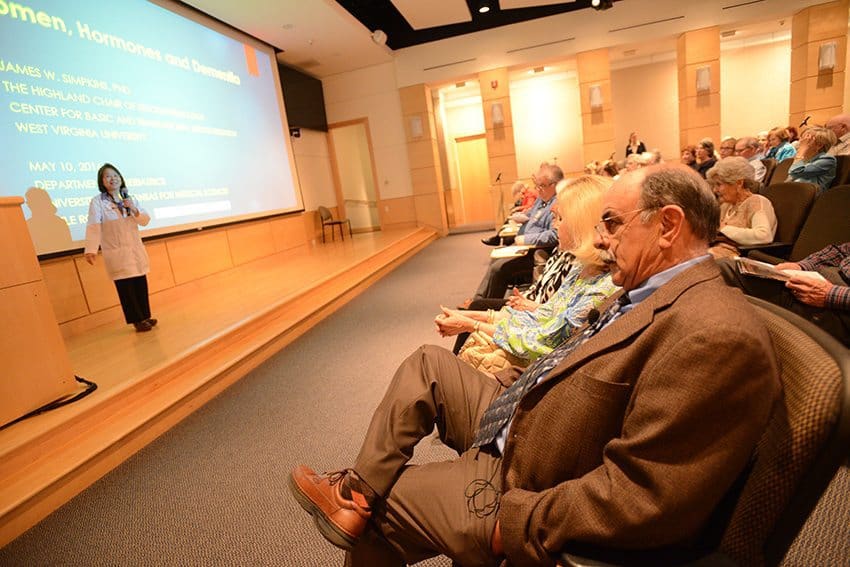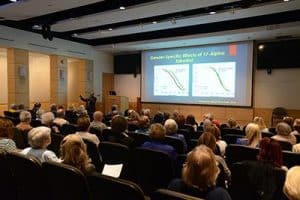STOP Alzheimer’s Forum Focuses on Women
| May 20, 2016 | Nearly two-thirds of people with Alzheimer’s disease are women, and a STOP Alzheimer’s education forum audience recently found out how, in some cases, estrogen-replacement might help some perimenopausal women to reduce the risk of Alzheimer’s dementia.

James Simpkins speaks to the STOP Alzheimer’s audience about his research into the linkage between menopause and Alzheimer’s disease in women.
Several dozen people gathered in the Jo Ellen Ford auditorium May 10 at the UAMS Donald W. Reynolds Institute on Aging to hear James W. Simpkins, Ph.D., director of the West Virginia University Center for Basic and Translational Stroke Research, discuss his research findings regarding the relationship between estrogen, menopause and Alzheimer’s disease.
The Strategies Toward Overcoming and Preventing (STOP) Alzheimer’s Fund is a UAMS-created program that raises awareness about the disease and supports Alzheimer’s disease research at the institute. In 2015, STOP Alzheimer’s held two similar events about aspects of Alzheimer’s disease and research into it.
The audience also heard from Jeanne Wei, M.D., Ph.D., executive director of the institute, and Sue Griffin, Ph.D., professor and vice chairman for research in the Donald W. Reynolds Department of Geriatrics in the UAMS College of Medicine.
Griffin, an internationally known Alzheimer’s researcher, told the audience about the prevalence of Alzheimer’s disease among women and the difficulties faced in getting information out about it.
“Some of the family around Alzheimer’s patients can be advocates, but the person with Alzheimer’s can’t be an advocate,” she said. “The people closest to them often are caregivers who are so overwhelmed taking care of them 36 hours a day that they don’t have time to be, but we can be their advocates. It’s us.”
In her introduction of Simpkins, Griffin described how he has long been engaged in the search for understanding of how hormones, especially estrogen, may be used to reduce the risk of Alzheimer’s disease.
Simpkins said findings from the $1 billion NIH-funded Women’s Health Initiative (WHI) in the early 2000s led many physicians to conclude that estrogen-replacement therapy of post-menopausal women is unsafe, leading to increased risk of stroke and heart attack. He faulted the study for the types of estrogen-replacement medications used in it and for not breaking down the study’s population into subgroups by age.
Subsequent analyses of the initiative’s data and other studies found younger, perimenopausal women did well with estrogen. Symptoms were relieved, and the negative effects from it were mostly in older women, Simpkins said.
However, if women begin receiving estrogen medications in the time just before or at the beginning of menopause, then they are much more likely to avoid experiencing symptoms of Alzheimer’s disease and cognitive decline as a result of menopause, Simpkins said.
“Please do not take my advice as medical advice, but go to your doctor and ask about it,” he said during a question-and-answer session after his main presentation.
He cautioned that estrogen can cause cancer tumors to grow faster, although it doesn’t induce cancer. Simpkins also doesn’t recommend the therapy for women with a cancer history.
“Most of our Longevity Clinic patients at the institute are at least 15 years post menopause,” Wei said. “We worry about other issues that cannot be remedied by estrogen per se. There also is a very real and significant concern with the risk of breast cancer associated with estrogen therapy. Increased breast cancer was the main reason the WHI was terminated early by NIH. It’s a different equation once you are 15 or more years out. I wanted to bring that up for our consideration and discussion. The median age of patients in our Longevity Clinic is around 85, or more than 30 years post menopause.”
Griffin, Wei and Simpkins all said Alzheimer’s research is drastically underfunded.
Americans spend about $1 billion on Super Bowl weekend festivities and food, but nationally and annually, only $850 million on research into Alzheimer’s disease, Simpkins said.
Medicare alone spends about $110 billion annually on health care for Alzheimer’s patients.
“Despite the fact that Alzheimer’s is this dark cloud pushing our way, if we don’t solve it, it will bring our health care to its knees with the cost of care,” Simpkins said. “We’re ignoring the issue as a society and giving a token amount to it.”

